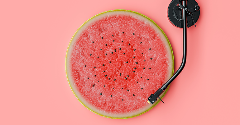sponsored content
Award-winning startup uses enzymes to cut sugar in fruit juice
31 Jan 2019Fruit juice has come under fire for its high sugar content in recent years, but an Israeli startup called Better Juice has developed an enzyme technology that cuts sugars by up to 80% without adding or subtracting anything from the juice.

The company won the Most Innovative Technology award at the 2018 Startup Innovation Challenge at Health ingredients Europe in Frankfurt for its sugar reduction process, which it developed in conjunction with The Hebrew University in Rehovot, Israel, and The Kitchen Hub incubator. “I truly believe our solution is revolutionising the juice industry,” said Better Juice CEO Eran Blachinsky. “It’s a game changer for the juice and beverage industry.”
Consumers concerned about sugarFruit juices may contain the nutrients of fresh produce, but they lack fibre and are a concentrated source of calories and sugars. According to Mintel, juice manufacturers have seen a steady decline in sales over the past decade as they face increased competition from other beverages, like teas and waters, and as consumers have responded to concerns about high sugar content. A recent poll from market research organisation Sensus found that a quarter of adults surveyed in France, Germany, the UK, Italy and Sweden actively sought out low sugar products, and 60% said they monitored their sugar intake. “We are bringing a solution that answers an unsolved problem in the market,” Blachinsky said. A novel and natural solutionThe company uses enzymatic activity of non-GMO microorganisms to convert sugars into other compounds. While the technology can reduce the sugar content of any fruit juice, those that contain sucrose – like orange juice, for example – also get a fibre boost, as enzymes convert the sucrose to fructooligosaccharides (FOS), a prebiotic dietary fibre used to enrich many food products. “It’s cost effective and treats all types of sugars,” Blachinsky said. “We are focusing on the juice producer market – and juice is not just drinking juice that you are familiar with in the supermarket.”The degree of sugar reduction depends on the target product, with deeper reductions possible for those that use fruit juice as an ingredient, such as ice cream, confectionery, juice drinks and cakes. The process takes place in a metal column that would be installed on a juice manufacturer’s production line, and allows for sugar reduction of 30% to 80%.For pure fruit juice, the company recommends a 30% reduction to avoid any bitter or sour flavours, but in a product like ice cream flavoured with fruit juice, manufacturers could aim to cut sugars in the juice by 80%.Overcoming marketing challengesFrom a regulatory perspective, although nothing is added to or removed from the juice, European manufacturers will have to call the treated product a ‘juice drink’ rather than ‘juice’, and Blachinsky says this causes some companies to hesitate. “The juice industry is very conservative,” he said. “They are really afraid of not being able to call it juice, but this is only a marketing issue. Customers don’t know the regulation.”In the United States, the product can be called ‘juice’, but must be qualified as ‘enzymatically treated’ or ‘sugar reduced’ juice.Blachinsky says the company’s process has already attracted a great deal of interest, including from major multinational firms, and fruit juice produced with its technology should be available in supermarkets by 2020.Related news

Retail landscape lacks nutritious and affordable food, says ATNi
30 Dec 2025
A rapid increase in modern food retail has given retailers growing influence over consumer diets, according to global non-profit ATNi’s latest assessment.
Read more
Debate over ban on ‘meaty’ names for plant-based products reaches stalemate
26 Dec 2025
The debate over a ban on plant-based products using “meaty” terms has reached a stalemate, leaving manufacturers in limbo and still facing overhauls to their marketing and packaging.
Read more
Multi-sensory food and drink products to gain traction in 2026
16 Dec 2025
Trend forecasters predict that sensory elements will play a larger role, helping food and beverage brands differentiate themselves in a competitive market in 2026.
Read more
Big appetite for M&A between European and US food and drink companies
3 Dec 2025
Persistent tariffs on EU food and beverage exports have helped drive record levels of M&A activity between European and US companies this year, according to analysis by ING.
Read more
Non-UPF Program extends certification scheme to entire food industry
30 Nov 2025
The Non-UPF Program has extended its certification scheme to the wider food sector, championing a move towards healthier consumption habits.
Read more
Lancet study links UPFs to chronic disease risk
26 Nov 2025
UPFs are consistently associated with an increased risk of diet-related chronic diseases, according to a comprehensive review of global evidence in The Lancet .
Read more
Concerns swirl around cinnamon’s compliance with EU law
25 Nov 2025
Cinnamon may be a top functional ingredient, but it needs stronger protocols to ensure it meets EU food safety laws and quality standards, say researchers.
Read more
Oat Barista: Innovation for game-changing beverages
20 Nov 2025
Oat Barista is a clean label, sustainable, and innovative drink base specifically designed to create the perfect foam in one single ingredient.
Read more
How younger consumers are redefining ingredient choices and rejecting brand loyalty
18 Nov 2025
Gen Z and millennial consumers’ preferences for transparency, functionality, and purpose are “redefining the very nature of consumption itself”, says SPINS.
Read more
Hybrid formats and flexible positioning to disrupt category norms in 2026
17 Nov 2025
Trend forecasters expect food and drink to move more fluidly across occasions, functions, and formats as consumers seek versatility, novelty, and convenience.
Read more